11 Health Benefits Of Chlorella, Nutrition, & Side Effects
From aiding weight loss to boosting hair growth – this blue-green alga has many benefits.
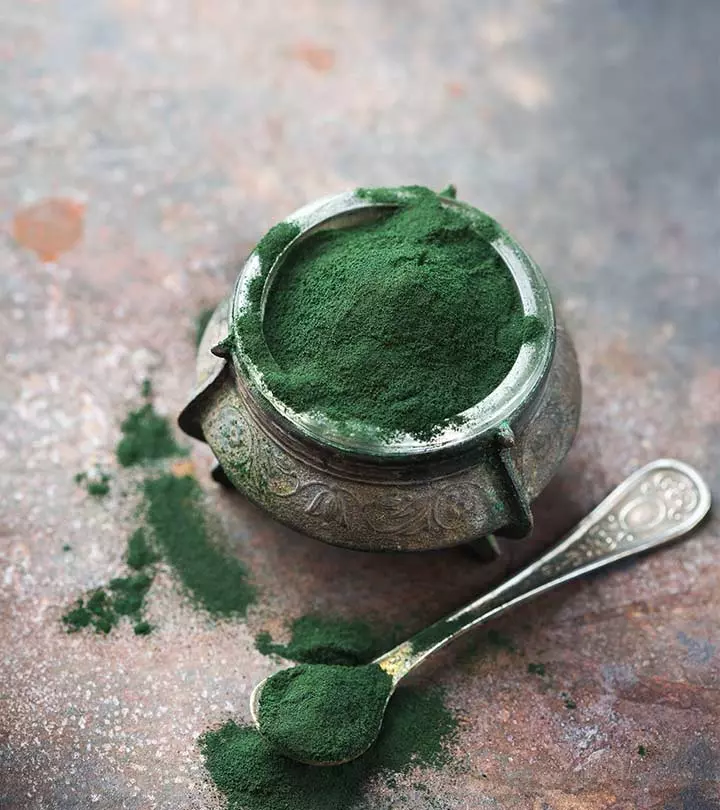
Image: Shutterstock
The benefits of chlorella are similar to those of spirulina. Its rich nutrient profile makes this blue-green alga a great source of health benefits. It contains various beneficial nutrients, including chlorophyll, protein, vitamin B12, and omega-3 fatty acids. Chlorella supplement can promote healthy weight management, heart and liver health, and a good complexion. In addition, it has antifungal properties that can reduce inflammation and prevent breakouts. This article discusses the importance of chlorella, its benefits, recommended dosage, nutritional profile, and possible side effects. Take a look.
 Know Your Ingredient: Chlorella
Know Your Ingredient: ChlorellaWhat Is It?
A freshwater, single-celled blue-green algae with many health benefits.
What Are Its Benefits?
It helps manage weight, improves metabolism, boosts heart and liver health, treats skin infections, and reduces body odor.
Who Can Use It?
All except pregnant and breastfeeding women and individuals with a weak immune system, iodine sensitivity or mold allergies.
How Often?
Initially, up to 2-3 gm every day.
Caution
Can cause the immune system to become hyperactive and increase the risk of autoimmune conditions, such as multiple sclerosis, lupus, and rheumatoid arthritis. Consult your doctor to find out the right dosage for you.
In This Article
What Is Chlorella?
As we already saw, chlorella is a blue-green alga. It is rich green, which comes from its high chlorophyll content – which is good news. Since chlorella contains more chlorophyll than most green leafy vegetables (or any vegetable for that matter), it can offer certain health benefits.
But aren’t algae bad? Well, it’s kinda complicated. Algae are both good and bad. Single-celled algae called phytoplankton are the main food source for fish and other aquatic animals – and these are the good algae. And then, there is another variety of algae called the cyanobacteria that can be toxic to aquatic life as well as humans. This is the bad variety (1). However, commercially cultivated cyanobacteria are nutritious – and chlorella falls under this category.
But what makes chlorella so nutritious? It is the presence of certain powerful nutrients – chlorophyll, protein, vitamin B12, omega-3 fatty acids, and beta-carotene. These nutrients are primarily responsible for the incredible benefits the algae can offer.
 Trivia
TriviaKey Takeaways
- Chlorella is a blue-green alga, rich in antioxidants that help prevent allergies and inflammations.
- The beneficial compounds in chlorella aid in weight loss, diabetes treatment, and improve heart health.
- The rich nutrition profile of chlorella may help combat and boost hair growth.
- However, it may cause autoimmune diseases and iodine sensitivity in some people.
What Are The Health Benefits Of Chlorella?
1. Chlorella Can Help You Lose Weight

If you have been trying to lose weight, we understand your plight. Adding chlorella to your diet can help accelerate weight loss. It achieves this by improving your metabolism, regulating hormones, and improving circulation. One study states how chlorella intake could reduce body fat percentage, ultimately aiding weight loss (2).
2. Can Aid Diabetes Treatment
Diabetes sure can be hard to deal with. But with chlorella, it has just become easier. If you want to supplement your diabetes treatment with something effective, chlorella might just be what you need.
This is because studies show how this alga can lower blood cholesterol and blood glucose levels. Chlorella is known to activate certain genes in your body that improve insulin sensitivity, and this encourages healthy blood sugar levels (3).
Studies also show how chlorella can prevent the formation of advanced glycation end products (AGEs) (4). These are proteins in your body that attract sugar molecules when they are exposed to bodily sugars, resulting in worsening of diabetes symptoms.
3. Can Improve Your Heart Health

You might be someone with a healthy heart. Or you could be popping pills to deal with some heart ailment. Whoever you are, chlorella can be of help. One way it can achieve this is by regulating blood pressure levels (5). Consuming this alga can help prevent hypertensioni A condition that affects the body’s arteries where the force of the blood against the artery walls is too high. and all the other evil baggage it brings with it – including stroke.
4. Can Help You Prevent Cancer
Statistics project 1,735,350 new cases of cancer in 2018 in the United States (6). And we don’t want you to be one of them. Apart from regular exercise and a healthy diet and lifestyle, consuming chlorella can be of immense help (7).
The alga boosts your immune system. It eliminates heavy metals from your system. And in case you already have cancer, it boosts the action of T cells (a type of immune cells) that fight the cancerous cells and aid faster treatment.
5. Can Reduce Inflammation In Your Body

Inflammation inside your body can often manifest itself in the form of severe diseases. Chlorella is a powerful and natural antioxidant. Also, the omega-3s in chlorella can help combat this inflammation and keep you much healthier. These antioxidants also help prevent allergies.
A blogger details her struggle with rosacea and the role of Chlorella in combating it. She started taking Chlorella to detoxify her body after having tested positive for high levels of metals such as lead in her body. A retest after 11 months showed that the amount of toxic metals in her body had dipped drastically. She concludes her experience as follows: “Although I do still have rosacea and suffer from occasional flare ups brought on by specific triggers, there is no doubt that I have come a long way in enabling my body to be more in control and less susceptible to certain triggers that previously would have brought me to my knees (i).”
Though there is more research required, this sure is one encouraging step.
6. Promotes Cellular Detoxification
Chlorella plays a major role here. It binds to toxic compounds and other heavy metals in the system and excretes them, thereby detoxifying your body right from the cellular level.
7. May Reduce Body Odor

Though there is limited research, some sources suggest that chlorella can eliminate body odor and even freshen your breath (8).
8. Boosts Liver Health
Chlorella supports liver health, which can help prevent severe liver ailments – including non-alcoholic fatty liver disease
(9). Regular intake of chlorella can keep your liver functioning at its best, thanks to its detoxifying properties.
9. Can Help Fight Candida
Chlorella can promote the growth of friendly bacteria, and this helps fight candida infections. Chlorella also contains beta glucan that improves the functioning of antibiotics – this helps reduce multiple prescriptions of antibiotics.
Chlorella also enhances the growth of macrophages, which are immune cells known to destroy the virus causing candida.
10. Combats Acne

Studies have shown that chlorella extracts can inhibit the proliferation of Propionibacterium acnes, which cause acne (10). Chlorella is also known to reduce the production of certain enzymes produced by P. acnes that can cause inflammation and aggravate acne.
This property of chlorella can also help delay the signs of aging. Chlorella also accelerates wound healing.
11. Can Boost Hair Growth
Chlorella is one of the richest sources of vitamin B12, a nutrient important for hair health. Studies have shown how vitamin B12 deficiencies can often lead to premature hair loss. Other nutrients in chlorella, like selenium, zinc, and calcium, can make the hair shiny and soft.
These are the different ways chlorella can improve your life. And we are sure you would have heard of spirulina as well. We saw the two are cousins – but let’s understand their subtle uniqueness in the form of chlorella vs spirulina ion the section below. Scroll down.
Spirulina Vs. Chlorella
Both of them are waterborne organisms. But they are quite different from each other at the cellular level. Of course, the benefits of spirulina are incredible as well.
While both contain high levels of protein for energy, where they differ is in the specific nutrients they contain in abundance. The benefits of spirulina include its richness in vitamin A – just a single dose can treat vitamin A deficiency.
On the other hand, chlorella is a step ahead as it contains phytonutrientsi Natural compounds or substances produced by plants with anticancer and cardio-protective properties. and phytochemicals that help in detoxification and also boost immunity.
Chlorella seems to be far more nutritious than its cousin. And yes, we suggest you keep one thing in mind – chlorella’s tough exterior walls are not easy to digest. So, if you are buying chlorella supplements, ensure you go for the ‘cracked cell wall chlorella’ variety for easy digestion.
Chlorella and chlorophyll are often confused due to similar-sounding names. However, there are key differences between the two. Find out more in the next section.
Chlorella Vs. Chlorophyll
Chlorella is a single-celled green algae found in freshwater bodies. Its high nutritional content makes it a popular dietary supplement. Chlorophyll, on the other hand, is a green pigment found in plants that is essential for photosynthesis.
Chlorella is rich in essential proteins, vitamins, and minerals that may boost immune function (11). Chlorophyll may help in wound healing and combat oxidative stress (12). Lastly, chlorella is often consumed in tablet or powdered form, while chlorophyll is consumed as liquid drops, capsules, powder, or chewing gum.
Let’s now take a look at the nutritional spectrum of this so-called superfood, chlorella.
What Is The Nutritional Profile Of Chlorella?
| Protein | ||
|---|---|---|
| Amounts Per Selected Serving | %DV | |
| Protein | 58.4 g | 117% |
| Vitamins | ||
| Amounts Per Selected Serving | %DV | |
| Vitamin A | 51300IU | 1026% |
| Vitamin C | 10.4 mg | 17% |
| Vitamin D | ~ | ~ |
| Vitamin E (Alpha Tocopherol) | 1.5 mg | 8% |
| Vitamin K | ~ | ~ |
| Thiamin | 1.7 mg | 113% |
| Riboflavin | 4.3 mg | 253% |
| Niacin | 23.8 mg | 119% |
| Vitamin B6 | 1.4 mg | 70% |
| Folate | 94.0 mcg | 24 % |
| Vitamin B12 | 0.1 mcg | 2% |
| Pantothenic Acid | 1.1mg | 11% |
| Choline | ~ | |
| Betaine | ~ | |
| Minerals | ||
| Amounts Per Selected Serving | %DV | |
| Calcium | 221 mg | 22% |
| Iron | 130 mg | 722% |
| Magnesium | 315 mg | 79% |
| Phosphorus | 895 mg | 90% |
| Potassium | ~ | ~ |
| Sodium | ~ | ~ |
| Zinc | 71.0 mg | 473% |
| Copper | ~ | ~ |
| Manganese | ~ | ~ |
| Selenium | ~ | ~ |
| Fluoride | ~ | |
Pretty impressive, isn’t it? But how do you take chlorella, and how much?
What About The Dosage?
As we don’t know how much of chlorella one needs to take to avail its benefits, there is no specific dosage as such. However, while certain studies have found benefits with 1.2 grams of chlorella a day, others required as much as 7 to 10 grams.
But considering the research, most studies indicate a daily dosage of 2 to 3 grams. Make sure to start off with a low dose and slowly increase it.
You can take chlorella either as a powder or a tablet (supplement). If you are taking the powder, use it in a smoothie. Add half a teaspoon of chlorella to a banana smoothie, along with lime juice, protein powder, and coconut water. Adding these ingredients also helps hide the strong taste of chlorella.
If you are using tablets, you can take 3 to 6 of them, once to thrice a day (but check the packaging instructions too).
 Quick Tip
Quick TipTaking chlorella sure is simple, isn’t it? But we would like to tell you that not everything about it is rosy. Chlorella can cause some undesirable effects too.
What Are The Side Effects Of Chlorella?
- Issues During Pregnancy And Breastfeeding
There is not enough information on this. Hence, avoid chlorella intake during pregnancy and breastfeeding.
- Issues With Immunodeficiency
In people with a weak immune system, chlorella may cause bad bacteria to proliferate in the intestines – resulting in further complications.
- Mold Allergies
Chlorella can cause allergies in people already allergic to molds. To ensure your safety, it’s crucial to seek professional advice before starting chlorella supplements. This is particularly important for those with known allergies or underlying medical disorders. By choosing high-quality, tested products, you can further reduce the risk of negative effects, ensuring your health and well-being.
- Iodine Sensitivity
Since chlorella also contains iodine, it can cause reactions in people with iodine sensitivity.
- May Cause Autoimmune Diseases
Since chlorella can cause the immune system to become more active, it can increase the risk of autoimmune conditions like multiple sclerosisi An autoimmune disease that affects the central nervous system (brain, spinal cord, and optical nerves). , lupus, rheumatoid arthritisi A chronic autoimmune and anti-inflammatory disease that mainly affects many joints at once and causes swelling and pain. , and other conditions.
Infographic: How To Use Chlorella For Skin And Hair
Chlorella is a green alga with numerous health benefits thanks to its nutrient-rich profile. Its benefits extend to the hair and skin, as it is replete with antioxidants, omega-3 fatty acids, and protein.
Check out the infographic for two DIY recipes with chlorella that you can use for skin and hair, respectively. Illustration: StyleCraze Design Team
The benefits of chlorella are numerous. These benefits can be attributed to its beneficial nutrients. Chlorella aids in weight loss and diabetes treatment and improves cardiovascular, liver, and hair health. It reduces the risk of cancer and inflammation and promotes cellular detoxification. In addition, chlorella reduces body odor, helps fight candida, and effectively combats acne. However, it may cause issues in pregnancy and trigger immunodeficiency, mold allergies, iodine sensitivity, and autoimmune diseases. Hence, caution is advised.
Frequently Asked Questions
Where to buy chlorella?
You can procure chlorella from your nearest departmental store.
What is the chlorella growth factor?
Chlorella growth factor is a water-soluble extract of chlorella that contains amino acids, sugars, proteins, vitamins, peptides and nucleic acids. Most of the chlorella available in the US is processed and made into these liquid extracts.
Can you take chlorella and spirulina together?
Yes, taking both can have better benefits. You will get an abundance of protein as well.
Can I take Chlorella with medication?
Some medicines may interact with chlorella, perhaps changing their efficacy or leading to unfavorable side effects. The best person to provide you with advice on the safety and suitability of taking chlorella supplements with your particular drugs is your doctor.
Is chlorella a good source of dietary fiber?
Chlorella is a form of green algae that has a lot of fiber—2 grams per 100 grams, to be exact. Thus, it is crucial for preserving digestive health since these fibers can control bowel motions and ward off constipation.
Illustration: Health Benefits Of Chlorella Nutrition & Side Effects
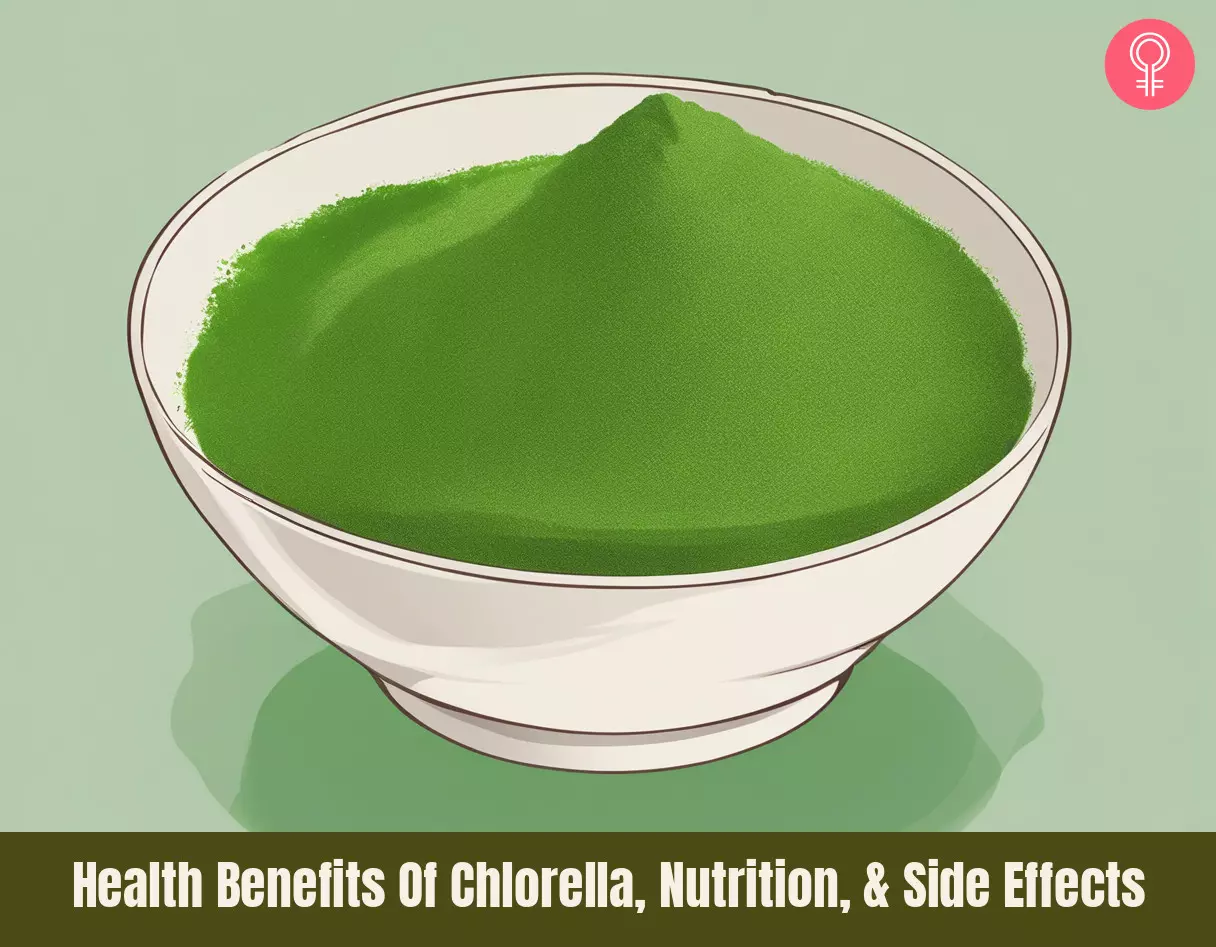
Image: Stable Diffusion/StyleCraze Design Team
Discover the wonders of chlorella and learn how to incorporate this incredible superfood into your daily diet. Watch this video to explore its benefits and get practical tips for using it effectively.
Personal Experience: Source
StyleCraze's articles are interwoven with authentic personal narratives that provide depth and resonance to our content. Below are the sources of the personal accounts referenced in this article.
i. Rosacea And Detoxifying With Chlorella – My Storyhttps://heres2yourhealth.wordpress.com/2011/09/23/rosacea-chlorella-and-detoxifying-my-story/
References
Articles on StyleCraze are backed by verified information from peer-reviewed and academic research papers, reputed organizations, research institutions, and medical associations to ensure accuracy and relevance. Read our editorial policy to learn more.
- “The good, the bad, and the algae”. NASA.
- “Nutrigenomic studies of effects of…”. Journal of Medicinal Food.
- “Beneficial effects of chlorella on glucose…”. US National Library of Medicine.
- “Therapeutic potentials of unicellular…”. US National Library of Medicine.
- “Anti-hypertensive effect of…”. US National Library of Medicine.
- “Cancer statistics, 2018”. US National Library of Medicine.
- “Chlorella vulgaris triggers…”. US National Library of Medicine.
- “How to avoid embarrassing…”. Dr. Mercola’s Health Blog.
- “Investigation of the effects of…”. US National Library of Medicine.
- “Inhibition of lipase and inflammator…”. US National Library of Medicine.
- “Potential of Chlorella as a Dietary Supplement….”. US National Library of Medicine.
- “Medicinal Uses of Chlorophyll…”. US National Library of Medicine.
Read full bio of Sarah Spann
Read full bio of Ravi Teja Tadimalla
Read full bio of Arshiya Syeda
Read full bio of Aparna Mallampalli






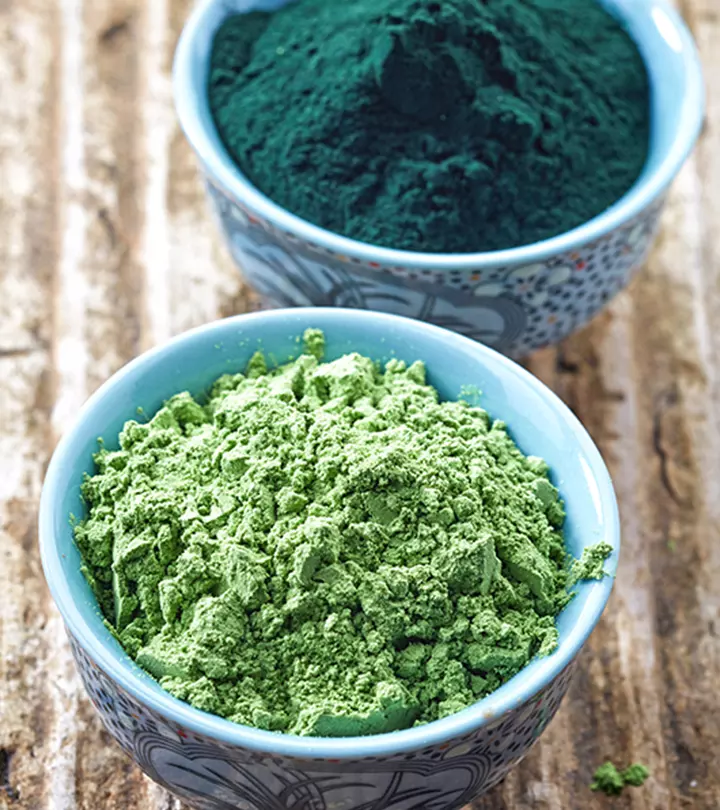

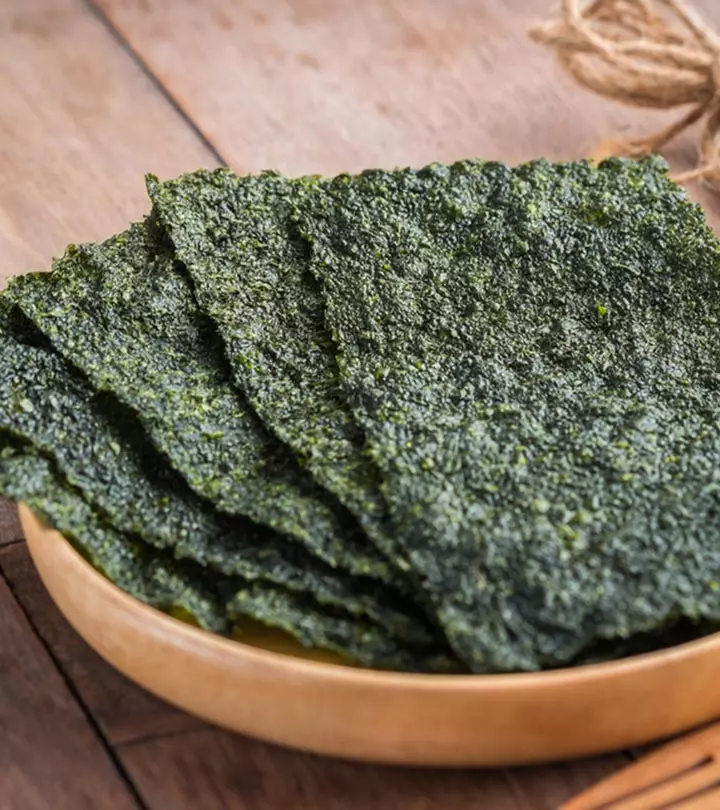
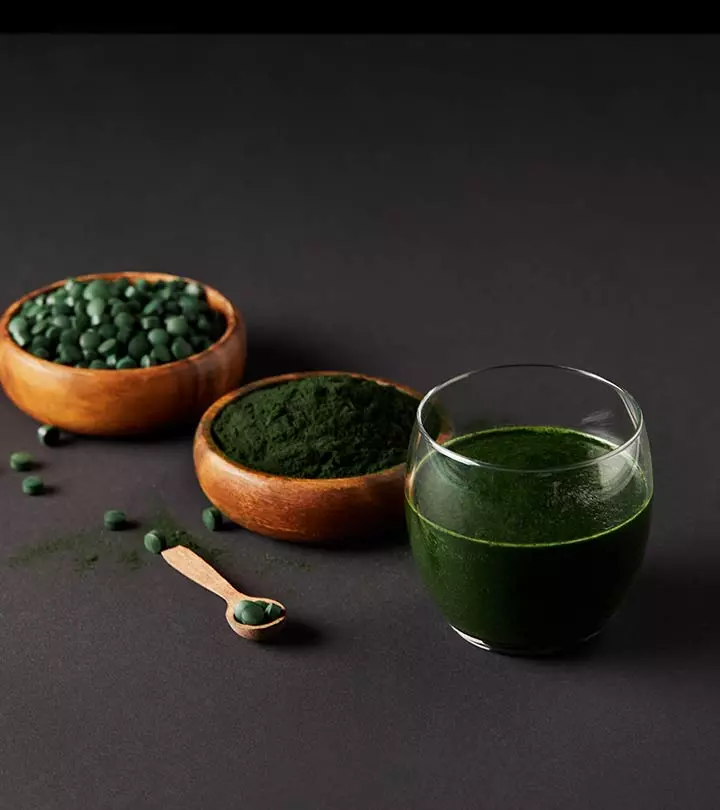


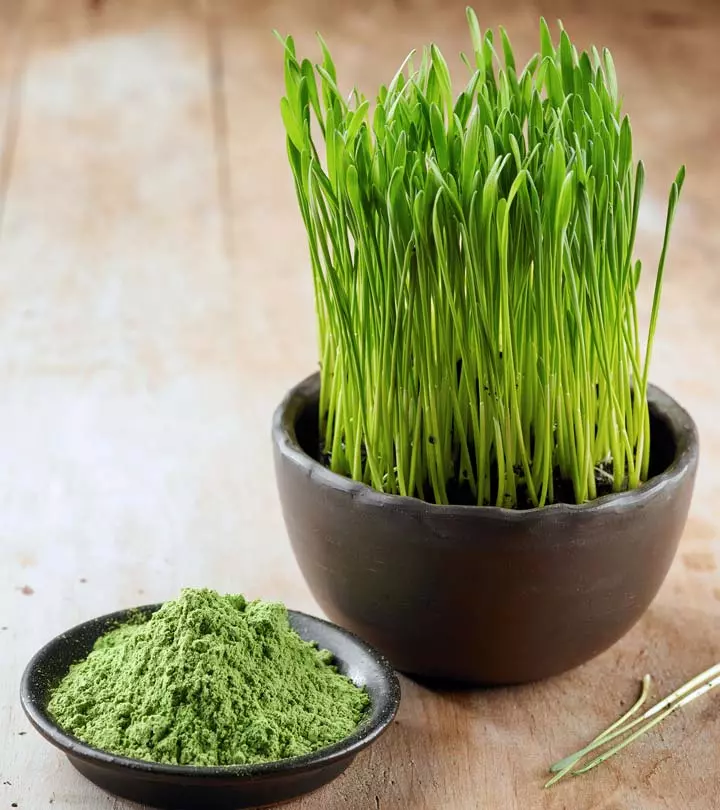
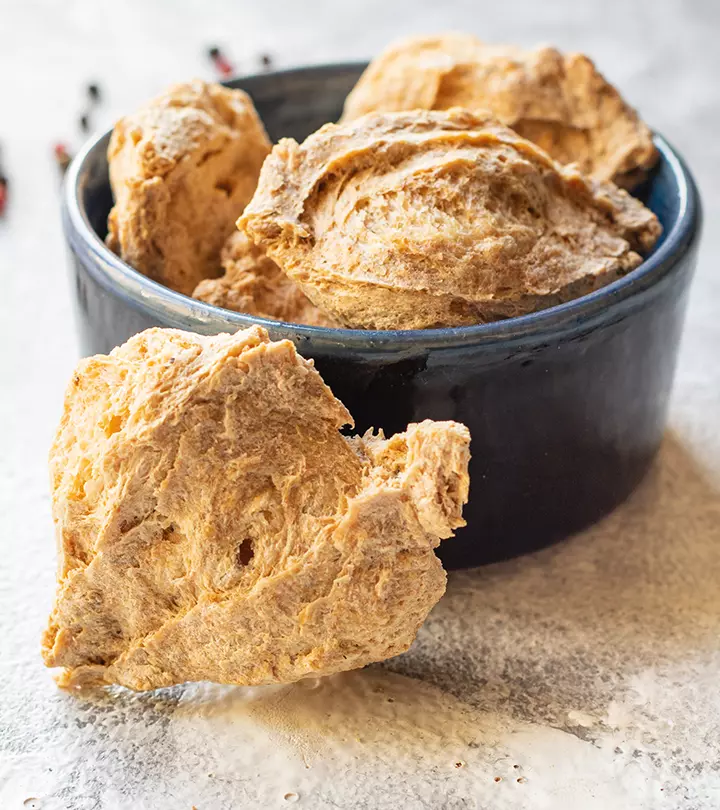
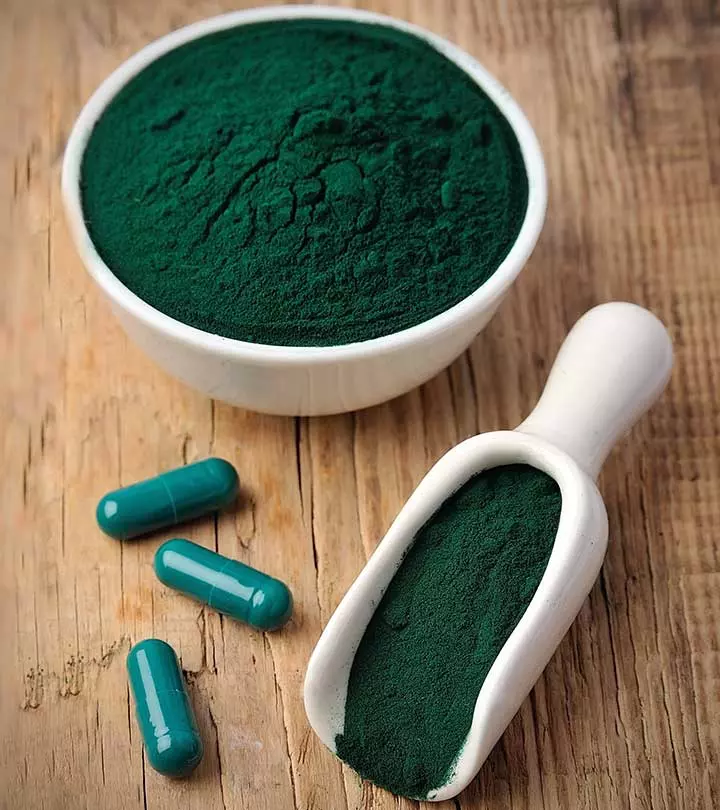
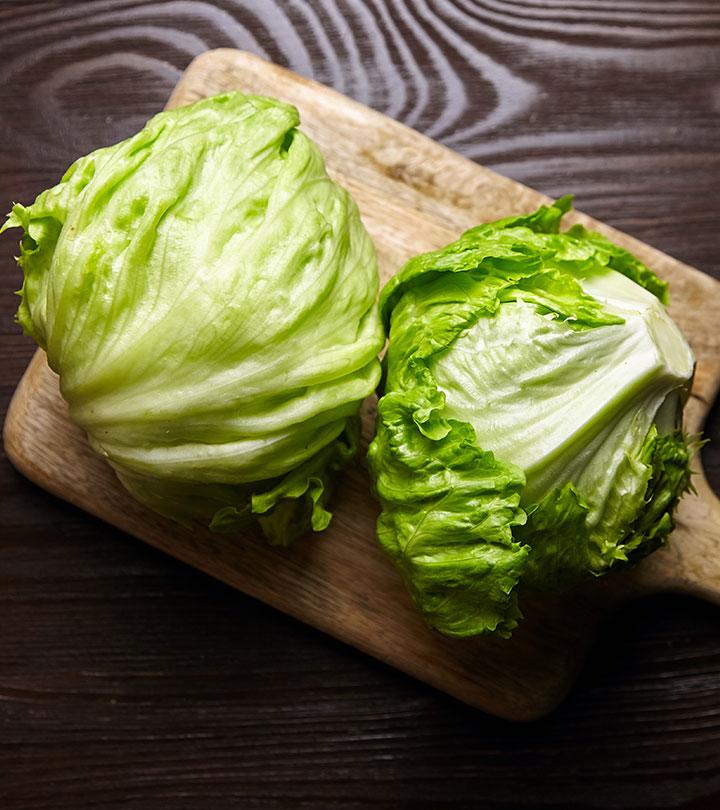
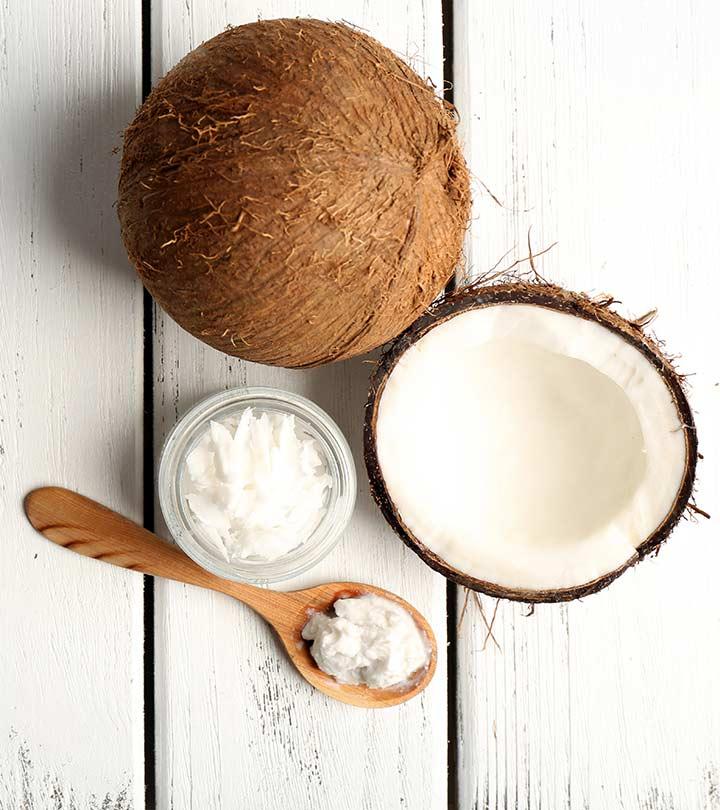


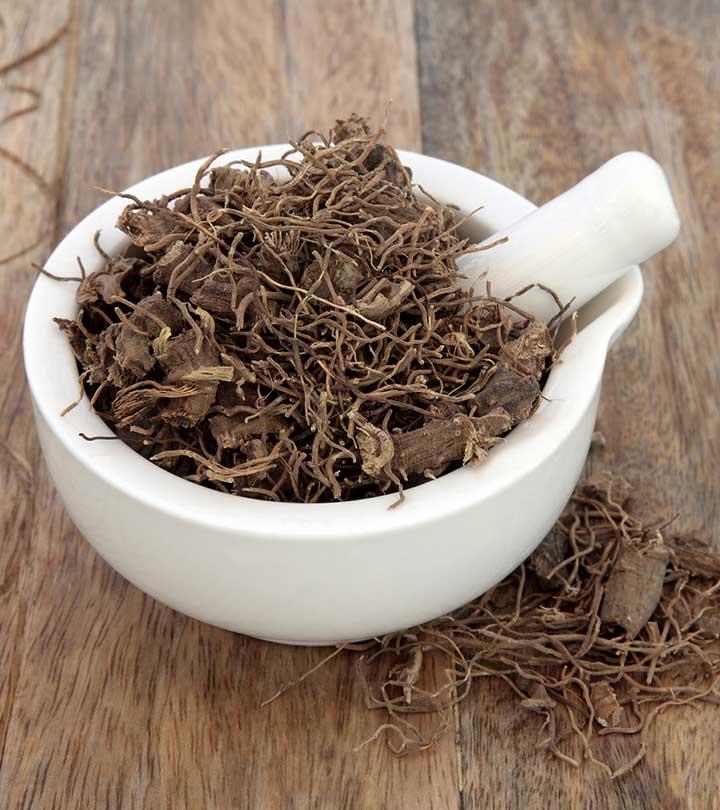


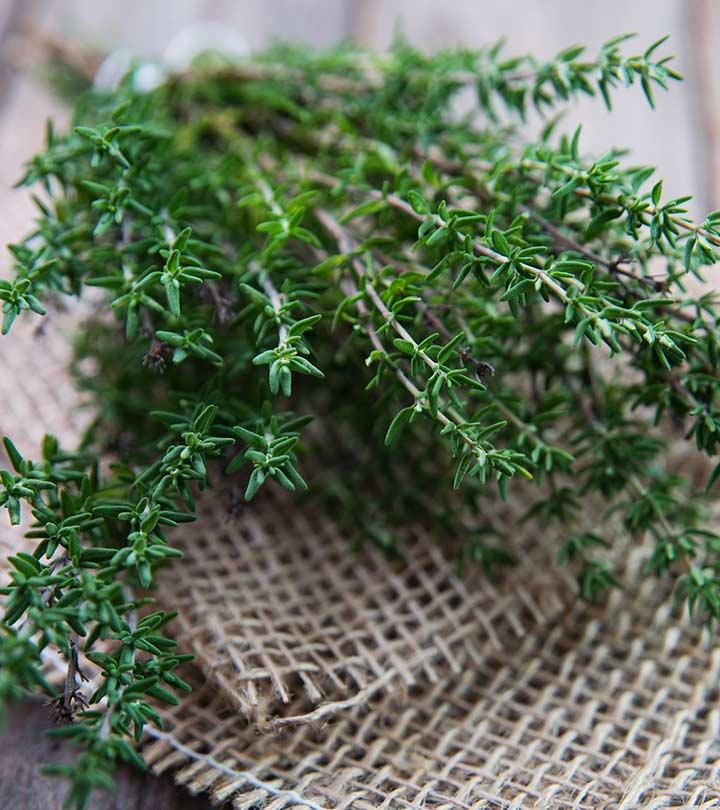


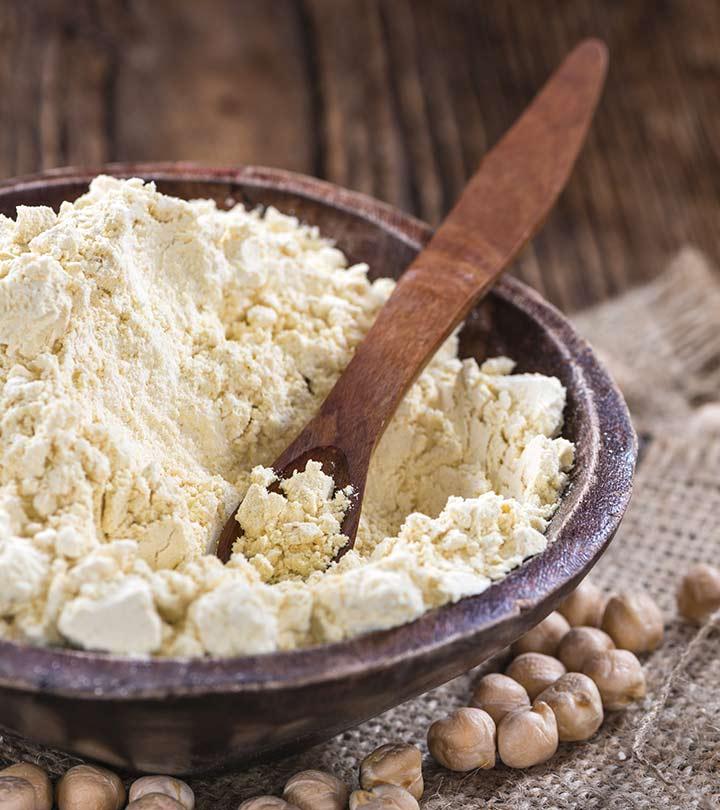

Community Experiences
Join the conversation and become a part of our empowering community! Share your stories, experiences, and insights to connect with other beauty, lifestyle, and health enthusiasts.